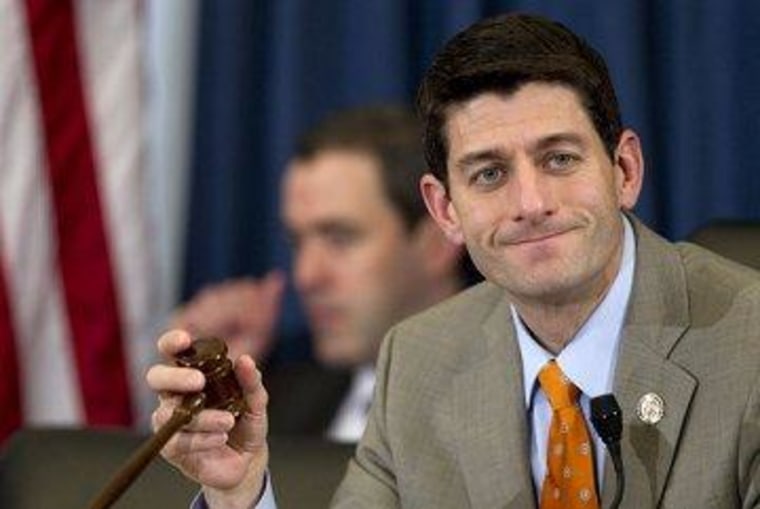When House Budget Committee Chairman Paul Ryan (R-Wis.) unveiled his budget plan, he acted as if the 2012 elections had never happened, so there was no need for his Republican Party to change. Apparently, the vast majority of his GOP colleagues feel exactly the same way.
The House of Representatives successfully passed Republicans' 2014 budget on Thursday with four votes to spare, relying only upon GOP votes to advance Wisconsin Rep. Paul Ryan's third budget blueprint.The House voted 221-207, largely along party lines, to advance the budget for the next government fiscal year. The plan seeks to balance the budget within a decade, primarily by saving $4.6 trillion through cuts to spending, and reforms to Medicare that would transform the plan into a "premium support" (or voucher) system.
Though there were whispers that GOP leaders had to worry about significant defections, only 10 House Republicans broke ranks and opposed Ryan's budget -- the exact same number of Republicans who voted against their party's budget blueprint last year.
And what a plan it is. We're talking about an ambitious plan to redistribute wealth -- from the bottom up -- with a healthy dose of "almost frighteningly ambitious" social engineering. Ryan's budget would end Medicare, cut taxes by over $5 trillion, take health care benefits away from millions of Americans, make "massive" cuts to programs for low-income and vulnerable Americans, and rely on smoke and mirrors to balance the budget within a decade.
It is, in other words, the exact opposite of what the American mainstream wants, and bears no resemblance to the platform the American electorate endorsed in national elections four months ago. It's designed to satisfy folks who believe the wealthy are over-burdened by taxes and struggling families have too much access to affordable health care.
Despite all of this, 95% of House GOP lawmakers voted for the plan anyway.
In an interesting twist, Democrats are thrilled.
Opinions vary as to how much impact, if any, Ryan's budget had on the 2012 congressional elections, but Democrats believe Republican votes on this plan represent a treasure trove for 2014 attack ads. If the House minority has any chance at becoming the House majority, it's going to need to convince voters that Republicans have a radical agenda and extremist vision, and Ryan's plan, at least in theory, makes the Democratic job that much easier.
In a conference call organized by the DSCC, pollster Geoff Garin told reporters last week, "The Ryan budget will be a gift that gives throughout the 2014 cycle for Democrats." DSCC Executive Director Guy Cecil added that privatizing Medicare will be important, but the Ryan plan also leaves Republicans vulnerable on issues like education and tax fairness.
"What the Ryan budget does to education ... is really fertile ground in terms of speaking to voters about how and why Republican candidates are out of touch," Cecil said. "They are unwilling to compromise. They are doubling down on their extreme policies, and the Ryan budget will cement that view."
Finally, let's also keep in mind that House Republicans cast this vote for no particular reason -- it's not going to pass the Senate and the vast majority of its provisions will never become law. GOP lawmakers stuck their collective necks out on this vote, and they'll get a pat on the back from the leadership for their trouble, but there's no practical reward for Republicans endorsing a budget plan the American mainstream doesn't like at all.
So what happens now? Interestingly enough, the Ryan budget will go to the Senate, where Republicans aren't eager to express a preference, but where the Democratic majority wants to get members on record, either supporting or opposing the plan.
